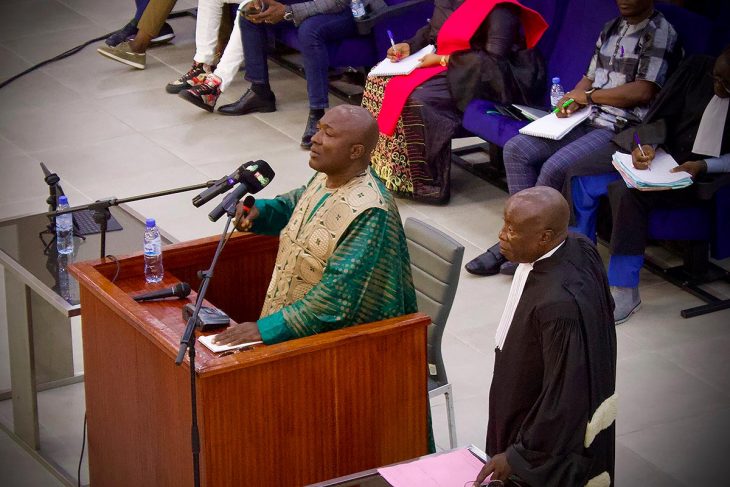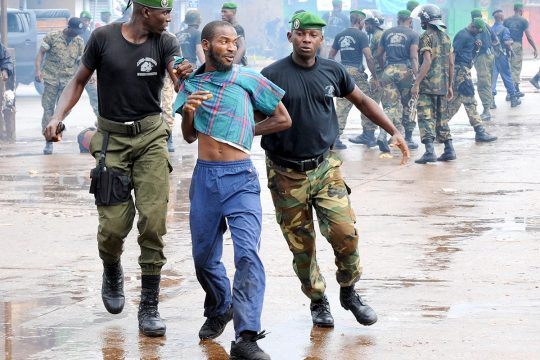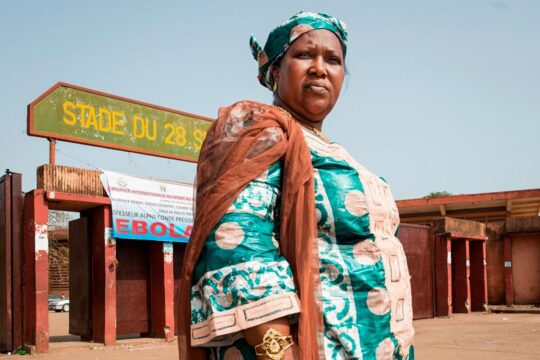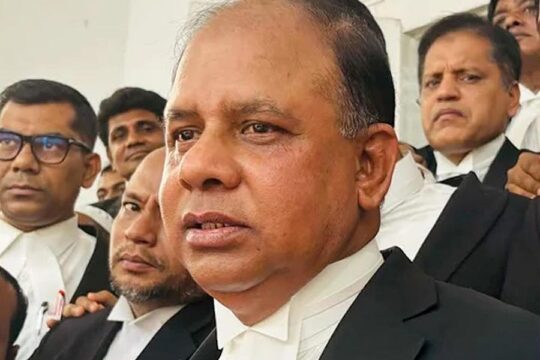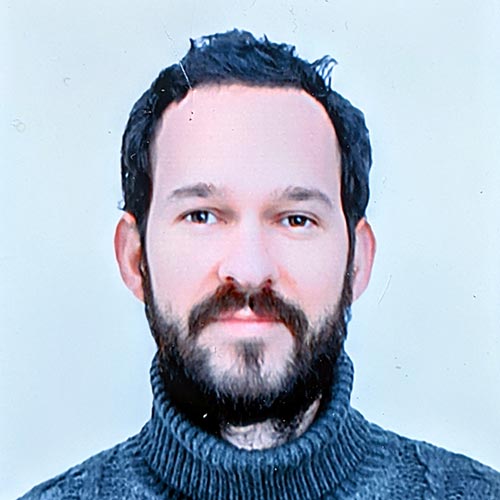"On the morning of September 28 [2009], did you find Dadis overexcited?” On the stand, Aboubacar Sidiki Diakité, known as "Toumba," responded by launching into an imitation of former Guinean head of state Moussa Dadis Camara, walking nervously in the middle of the courtroom and drawing laughter from the audience. Dadis "wasn't the same" that day, said Toumba, who is now charged in the same trial as his former leader. When Dadis learned that the opposition would hold its meeting at all costs, he became very angry, said the defendant. "They will regret it, the power is in the street, they must be subdued," said the man who had been head of the military junta for just nine months, thus giving the signal, according to Toumba, for the bloody repression.
The appearance of Toumba, a key figure in the massacre that plunged Guinea into shock and mourning - more than 150 dead and a hundred women raped during an opposition rally at Conakry's main stadium -, was eagerly awaited in the trial that opened on September 28 in the Guinean capital, 13 years after the tragedy. When he took the stand for the first time on Wednesday, October 19, the room was suddenly buzzing. Would his interrogation live up to its promise? Some witnesses claim to have seen Toumba beating demonstrators and even shooting people in the covered stands, but he pleads not guilty and rejects all the charges against him.
From the outset, he promised to tell "his part of the truth" and began to recount in detail a story previously unknown to Guineans. For more than an hour, he recounted the seizure of power by the National Council for Democracy and Development (CNDD) in December 2008. The audience was captivated. Toumba described how a handful of military men, gathered around Dadis Camara, manoeuvred to take over the country after the death of President Lansana Conté, who had been in power for 24 years. Through violence, intimidation and a clever game of influence, the little captain became leader of a junta ruling by brutality, humiliation and nepotism. Marcel Guilavogui, Dadis's nephew who is now among the accused, was a perfect illustration. Without official attribution, he could do whatever he wanted, according to Toumba, who described him as a "free electron”.
The Dadis system
Within the army and junta there was an unofficial organizational chart, Toumba told the court, with each person’s power measured by their proximity to the angry and unpredictable leader, Toumba said he was pushed aside after one hundred days in power. Although he remained close to the head of state and watched over him as his aide-de-camp, he was no longer involved in all decision-making, Toumba said.
Before the coup, the two men sealed a pact of loyalty in a mystical ceremony. "Captain Dadis had a great fetishist from Guinea’s Forest region come to him. The latter declared that whoever betrayed the other would receive a bullet," Toumba recounted. A few months later, Toumba shot Dadis and wounded him in the head. Evacuated to Morocco for treatment, the coup leader was definitively removed from power in January 2010. On the stand, Toumba defended himself, saying that Dadis was plotting against him: "They wanted to use me, to finish me off. They had to find a scapegoat.”
A complex and even strange character, Toumba presents himself as Dadis Camara's "spiritual advisor" and maintains that he "predicted" everything that was going to happen. In the course of his narrative, he quoted verses from the Koran and made numerous religious references. The military man looked theatrically towards the president of the court, the lawyers, the public, and sometimes even turned to his co-accused, inviting Dadis, seated in the front row, to acknowledge his responsibility in "what happened”. Because he was the president of the transition, the president of the Republic, the commander-in-chief of the armed forces, "he must ask forgiveness from the people of Guinea”, said Toumba.
Toumba played to the audience. Within the solemn walls of this court specially created for this trial, he appeared comfortable, continually wearing a slight smile and taking pleasure in ridiculing the lawyers. If he didn't like a question, he marked his astonishment with a high-pitched cry, triggering the hilarity of the audience. "It's a West African cry, but it contrasts with the seriousness of the trial," said a Guinean woman who watches reruns of the proceedings on national television every evening after work.
Seduction operation
Toumba has undertaken to restore his image. "Only the truth can set him free," said his lawyer, Youmba Kourouma. "I have been caricatured too much, painted black," said the accused. He said Dadis summoned him on the morning of September 28, 2009, and that he tried to dissuade the president from going to the stadium. But he learned shortly afterwards that Dadis had left his residence, so he went in search of him and quickly went towards the opposition meeting. Arriving there between noon and 1 p.m., he discovered a great "tumult”, with people running away, running in all directions. "I saw women being dragged along the ground," said Toumba, who claims he stayed 15 minutes. "You saw that, but you didn't intervene?" asked a defence lawyer. "At that time, I was worried about the leaders" of the opposition, Toumba replied. Inside the sports complex, he spotted them in the stands. He then had only one objective: to put them out of danger.
At the stadium, he met Marcel Guolavogui, head of a troop from the presidential regiment and saw red berets commanded by Moussa "Tiegboro" Camara, a colonel also in the dock. But he said no more. The rest of the story took place at the Ambroise-Paré clinic, where Toumba said he drove the opposition leaders in his personal vehicle. Guolavogui then allegedly caught up with them, brandishing "two grenades" and threatening to blow up the clinic if the politicians were admitted.
On Tuesday, October 25, Toumba was still on the stand, being questioned by the lawyers for the civil parties. "You have given many details about the CNDD's accession to power. Why, during your questioning here, did we not get such an account of the events at the stadium?” one of them asked. “We sensed some hesitation, some omissions on your part." When pushed, the accused may have to dodge or divert. But his seduction operation was a success and he is the talk of the town in Conakry. On the benches of open-air restaurants, in cafés and offices, everyone has their eyes riveted on Toumba's appearance. The former aide-de-camp, who was content to appear in the background behind Dadis on television during the junta, is now in the spotlight. "The path he’s embarked on, that of truth, is already paying off because it is drawing favour in public opinion," says Kourouma.
Turning point
Unity has been shattered amongst the defence lawyers of the eleven co-accused. "Toumba is hiding his true face,” said David Béavogui, counsel for Marcel Guilavogui. “With regard to the stadium massacre, he only says what suits him. He doesn’t want to answer all the questions, even though he promised to tell the truth to this court.”
Before the trial, the lawyers had reached an agreement: they would not question any defendant other than their client. But this unity has been shattered. "When you put carnivores and herbivores in the same pen, you can't proclaim peace," is how Kourouma puts it.
On October 26, Toumba faced a heated defence team. "You apologized to the civil parties, but without acknowledging the facts. Those who apologize accuse themselves. Are you consistent with yourself?" asked Mohamed Sidiki Bérété, another counsel for Guilavogui who is trying to exonerate his client. The latter claimed in court that he was bedridden on the day of the massacre, after being injured in a road accident. "Do you have any proof that Marcel was at the stadium? Apart from your mere accusation," the lawyer scoffed. In the defence, this blow to the non-aggression pact has made Toumba the target. And it has added spice to the trial.
The civil parties are delighted. Lawyer Halimatou Camara praised Toumba's attitude, saying that he "agreed to talk". "With Tiegboro Camara and Marcel Guilavogui, we understood nothing of their statements, they denied practically everything. But we must admit that with Toumba Diakité we had some information," she said during a recess. "Today, we have someone who has cleared the way a little, and I think we will get to the truth by the end of this trial." But she remains cautious. "We have the feeling that he does not want to incriminate himself. He has said he will give his part of the truth.”
Toumba has perhaps not yet told everything he knows. He has been heard for more than three days and returns to the stand this Monday October 31.


